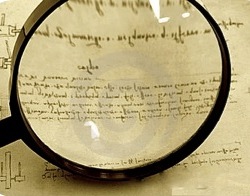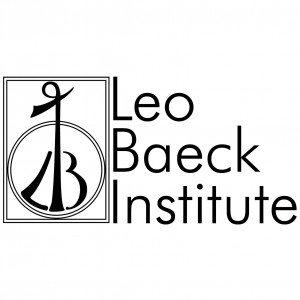Center for Jewish History Seminar on Archival and Historical Research
May 19-22, 2014
The Center for Jewish History Seminar on Archival and Historical Research is a four-day program for rising college seniors, MA students and first- and second-year doctoral students to learn the skills of conducting archival research at one of the premier research libraries in the United States. The seminar’s focus is on learning a variety of tools for accessing information and incorporating archival and library research into specific
projects. In addition, participants will be introduced to the vast holdings of the Center’s partner organizations, and the ways those collections are created, stored, and preserved.
The 2014 research seminar will welcome students from various disciplines including history, Jewish studies, literature, religion, politics, sociology, anthropology, as well as area and regional studies. Teaching sessions will be led by scholars familiar with the collections based at the Center; archivists and librarians of the Center’s five partner
organizations; staff members of the Center’s Lillian Goldman Reading Room; and the Center’s Graduate, Postdoctoral, and Senior Scholar Fellows. Participants will have the opportunity to conduct their own research in the Center’s Reading Room, utilizing the full complement of available research tools.
Applications are welcome from rising college seniors, recent university and college graduates, MA students, and PhD candidates in their first two years of matriculation.
Applications are due by March 17, 2014. For full application guidelines, please visit fellowships.cjh.org. Questions may be sent to Christopher Barthel, Senior Manager for Academic and Public Programs, at cbarthel@cjh.org.
**********
From Segregation to Integration: German-Language Communities in Latin America and their Interconnections with other Cultures
International Congress of Americanists (ICA)
University Francisco Gavidia, San Salvador
July 12-17, 2015.
We are seeking participants for a symposium tentatively titled: “From Segregation to Integration: German-Language Communities in Latin America and their Interconnections with other Cultures” to be held at the 2015 meeting of the CIA in San Salvador: http://www.ica55.ufg.edu.sv/
Much academic work on German-speakers in Latin America has focused on the initial cultural and structural isolation of their communities within their host societies. Much less has been written on their interactions with other ethnic minorities as well as local cultures and delve deeper into such relationships and to think through the kinds of identities that were formed during the mutual penetration of German and non-German communities
across Latin America during the nineteenth and twentieth centuries. At the same time, we also hope to use this meeting to bring the historiographical and theoretical traditions of European and Latin American history into dialog, and to move beyond the confines of national histories as well as current colonial and postcolonial theories. The ICA’s international character and the focus of the 2015 meeting, “Conflict, Peace, and
the Construction of Identities in the Americas,” offers us the perfect setting for these endeavors.
We are seeking contributions from scholars interested in exploring formal and informal interconnections and relationships between German immigrants and Latin American cultures and societies. We would welcome proposals that engage these questions at both micro and macro levels of analysis, and we are particularly interested in studies that focus on strategies developed by these ethnic minorities to negotiate the social
stratifications of their host societies (with greater and lesser degrees of success). We are also quite interested in comparative analysis of representations of “la alemanidad” across Central and South America-especially the production of those ideas, receptions of those representations, and efforts to counter and refute them.
We are planning to organize a bilingual symposium (English and Spanish). Scholars interested in participating in this symposium should send a title, a 500 word proposal, a short CV, affiliation and contact information, and 5 keywords (necessary for the applications) to Alma Duran (University of Augsburg, Germany) and H. Glenn
Penny (University of Iowa, USA): alma.duran@phil.uni-augsburg.de and
h-penny@uiowa.edu.
Please indicate as well if you would be willing to act as a commentator.
**********
Historians of German and Central European Art and Architecture
Call for Paper Proposals
The Historians of German and Central European Art and Architecture (HGCEA) and the Los Angeles County Museum of Art (LACMA) are co-sponsoring a symposium in Los Angeles on September 6 and 7, 2014 in conjunction with the exhibition Expressionism in Germany and France: From Van Gogh to Kandinsky to be held at LACMA June 8 through September 14, 2014. The exhibition will explore the French-German roots of Expressionism and its evolution before WWI in order to present a new understanding of the movement as one based on cultural interchange. The focus will include the role of mediators (museum directors and gallery owners), institutions, collectors, critics, and artists, and will apply new theoretical models of influence that are
de-centered and discursive. The symposium seeks to expand the topic of the exhibition geographically and chronologically.
Papers are sought that consider cultural networks and patterns of exchange between Central and Eastern Europe or Scandinavia and Germany and France in the late nineteenth as well as twentieth century. Antecedents to the international character of Expressionism could be investigated within Impressionism and Symbolism. Interactions with Cubists as well as Futurists (Russians included) could be another arena for exploration. Histories of reception, collections, exhibitions, world’s fairs, travelling, and
publications could be considered as well as the role of nationalism, social geography, and local traditions.
Proposals no longer than one page should be submitted together with a current c.v. by *April 1* to jclarke@clarkart.edu; mortonmarsha10@gmail.com; and rcwlong@aol.com.
**********
Dispossession: Plundering German Jewry, 1933-1945 and Beyond
Conference at Boston University, November 9-11, 2014
Among the stereotypes about Jews circulating in Nazi Germany, perhaps the most prominent portrayed Jews not simply as rich, but as enriching themselves at the expense of non-Jewish Germans. It is one of the cruelest of ironies, however, that the Nazis were the real economic predators, robbing Europe’s Jews before murdering them. Within twelve short years, the Nazis managed to dispossess Germany’s Jews, taking away first their rights, then their property, and finally their lives.
Despite the enormity of the crime, however, the dispossession of the Jews has only recently become the focus of scholarly attention. To some extent, interest in the state-sponsored seizure of Jewish assets has been understandably overshadowed by the more pressing need to reconstruct and understand the Holocaust. If theft paled in comparison with murder, moreover, such technical problems as currency transfer restrictions, capital levies, and blocked accounts have seemed far too arcane to most historians to deliver significant insights into the nature of the “Third Reich,” much less the murder of Europe’s Jews. And where a lack of interest in financial history has not inhibited the study of the confiscation of Jewish assets, lingering concerns about confirming antisemitic stereotypes about Jews and money has. Finally, differences in analytical emphasis, such as a focus on the perpetrators instead of their victims, have perpetuated historiographic divisions between German and Jewish history. Those divisions have also contributed to a narrative incoherence that made it more difficult to identify the business of economic discrimination as an autonomous topic.
For all of these reasons, the organizers – Jonathan Zatlin (Boston University) and Christoph Kreutzmüller (Haus der Wannsee-Konferenz) – seek to bring together scholars from a variety of countries working on the financial history, social significance, and cultural meanings of the theft of Jewish assets by the Nazis. In addition to promoting intellectual exchange, we aim to overcome the historiographic divisions between Jewish and German history by combining the history of the victims with that of the perpetrators in novel ways. Drawing on what might be called the “economic turn” in the field of history, we seek to disrupt standard accounts of German Jews, which alternatively downplay the embeddedness of the Jewish community in German society or reduce the diversity of Jewish experience to the ravages of antisemitism, and instead integrate Jewish into German history by incorporating Jewish agency into the larger story of the Nazi dictatorship. By construing “dispossession” broadly, moreover, we aim to combine cultural interpretation with economic analysis of this theft in order to make the significance of this history more accessible to larger audiences.
The organizers welcome proposals on a variety of relevant themes, such as:
- The Jewish commercial presence under the Nazis, including regional and sectoral case studies
- Nazi justifications of expropriation and plunder
- The incompatibility of emigration and confiscation
- Legal and financial technologies deployed by the regime to confiscate Jewish assets
- The identification of assets as “Jewish”
- The theft of artwork
- The theft of Jewish communal property
- Gender as a demographic and financial issue
- Contemporary German reactions to the dispossession of the Jews
- German-Jewish responses to these measures
- The dispossession of German Jewry as a “learning process” or model for the rest of Europe
- Problems of restitution
The organizers expect to publish a selection of papers in a volume designed to break new ground by bringing together cultural, social, and economic history. The language of the workshop and the published volume will be English. Please send a 500-word abstract and a one-page CV to the following email address by March 1: disposs@bu.edu




